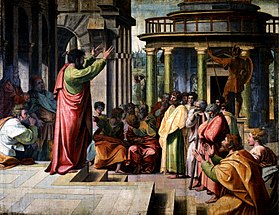In today’s First Reading Apollos teaches us that the truth is something very powerful, and the tools Our Lord has given us for evangelization can have a great influence if we use them well. Apollos did not have all the truths at his disposal or all the means of sanctification; he was not sacramentally baptized, just gifted with a Jewish upbringing, knowledgeable about Sacred Scripture, catechized, a good public speaker, and good at reasoning things out for himself and for others. He didn’t consider himself an armchair catechumen or a neophyte; he went out and tried to share the Word of God.
In comparison with Apollos we have a veritable arsenal at our disposal: a sacramental life, catechesis, the whole canon of Scripture, the teachings and inspiration of so many holy men and women down throughout the centuries, and, for some, a society founded on Christian principles and culture. As Christians it’s not just about what we have, but the fire with which we use it. Everyone can agree that today, even though there is an arsenal at our disposal, there are not enough Christians truly on fire for sharing the Word of God.
We need to stoke that fire. Easter reminds us that we can breathe new life into the deadest situations. On Pentecost the Holy Spirit made the fire of the first apostles flare up into an impulse for evangelization that swept across Asia Minor and into Europe. Let’s ask the Spirit to kindle in us that fire as well.
Readings: Acts 18:23–28; Psalm 47:2–3, 8–10; John 16:23b–28. See also 6th Week of Easter, Saturday.

